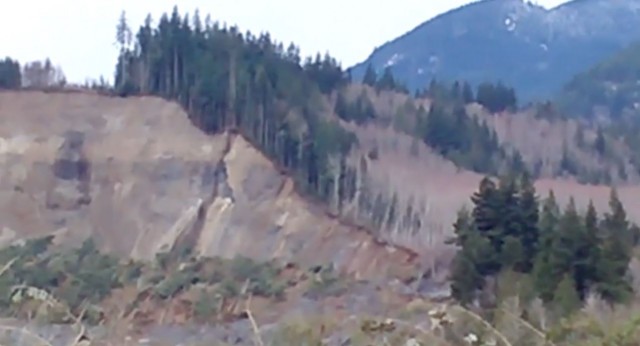11 March 2015
Oso landslide: a new video five minutes after failure
Posted by Dave Petley
Oso landslide
In the last few days a video has emerged, via the Everett Herald, of the aftermath of the Oso landslide in Washington State, USA almost a year ago. The video, which has been uploaded to Youtube, was shot by Elizabeth Honnerlaw, who was driving on Highway 530 shortly after the landslide, and came across the aftermath. She shot the footage via her mobile phone – it runs for about three minutes:
.
The video is interesting at a number of levels I think. First, the video of the behaviour of the rear scarp of the landslide, which is the main feature of the video, is notable. The rear scarp was popping off small failures every few seconds. This is not particularly surprising – other videos have shown the same effect, caused by the over-steepening of the rear scarp and the loose, wet material from which it had been formed. It might be interesting to look at the location on the slope from which these landslide originated – I wonder if there is a consistent pattern in terms of the stratigraphic level? If so this might tell us something about the strength and degree of saturation of the various layers:
.
And the lack of dust in the air is interesting too. It doesn’t appear to be windy, suggesting that this was probably because the landslide did not generate huge amounts of dust, supporting the idea that the landslide was very wet at the time of the failure.
But the most interesting aspect really is the sense of calm. You might think that in the aftermath of the landslide everything was very chaotic, but this video shows a shockingly tranquil scene. There is a news report about the video on K5, which includes some additional footage, in particular showing the rescue efforts that were going on at the time. The small number of fire fighters, survivors and passers-by had started to try to rescue people caught on the edge of the landslide. Of course at this point the main rescue teams had not arrived. Apart from these well-organised rescue attempts – I have massive admiration for these first responders, who had to deal with a dreadful situation, and coped wonderfully – it would be impossible to know that the landslide had just occurred.



 Dave Petley is the Vice-Chancellor of the University of Hull in the United Kingdom. His blog provides commentary and analysis of landslide events occurring worldwide, including the landslides themselves, latest research, and conferences and meetings.
Dave Petley is the Vice-Chancellor of the University of Hull in the United Kingdom. His blog provides commentary and analysis of landslide events occurring worldwide, including the landslides themselves, latest research, and conferences and meetings.
Shortly after this slope failure, I put together a couple animations using aerial imagery.
http://earthjay.com/?p=1425
thanks for the video. This is a great view that supports the hydrogeologic interpretation for a trigger source. http://www.geerassociation.org/GEER_Post%20EQ%20Reports/Oso_WA_2014/
So interesting to see the landscape trying to find a new “stable” formation. I find myself wondering what this will look like in many years to come and being a case study of an “Oops we probably knew we shouldn’t build here” scenario.
This is what learning is about and this progressive failure shows us where we should be looking on sites of older failures.